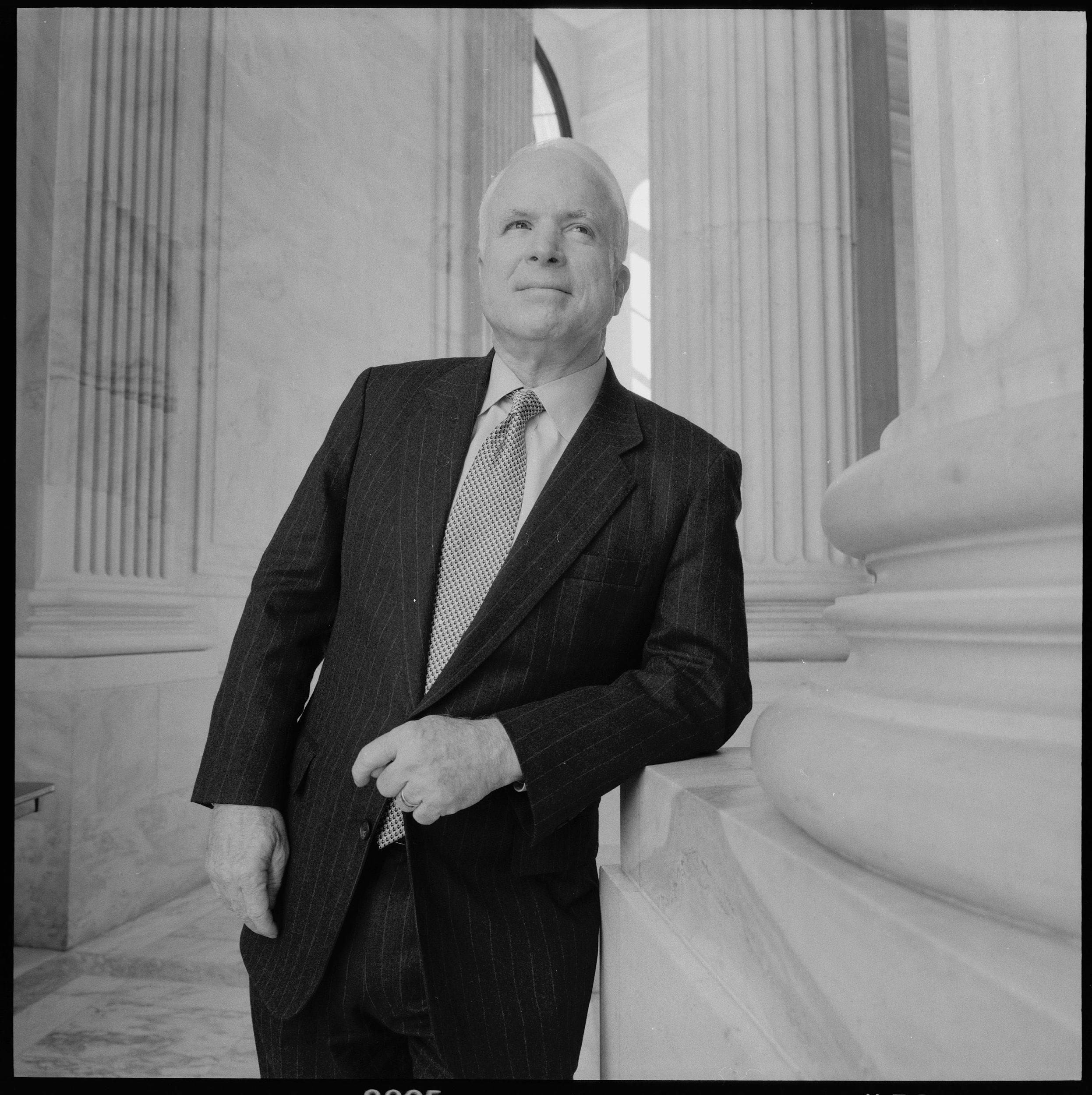
|
昨日,原亚利桑那州参议院约翰·麦凯恩因脑癌去世,美国政界要人纷纷悼念并赞扬了他的政治遗产。多年以来,麦凯恩在美国参众两院的风评褒贬不一,但他人生中的以下几个“高光时刻”,必然会被美国人长久纪念下去。 反对美国秘密刑讯暴恐嫌疑人 麦凯恩最引人注目的政治遗产,是他在“911”事件后坚决反对美军和情报机构对恐怖分子施以酷刑。当时,弥漫在全美范围内的恐惧正推动着美国人的道德标准转向。麦凯恩本人在越南时也曾遭到水刑等酷刑的折磨,而酷刑也是小布什时代美国的一大政治污点。 虽然不免有人指责麦凯恩在酷刑问题上食古不化、吹毛求疵,但麦凯恩对这个问题的立场基本上是一贯的。直到最近,他还公开批评特朗普钦定的中情局局长吉娜·哈斯派尔。因为哈斯派尔也曾负责过美国的一处秘密监狱,涉嫌对嫌疑人施以酷刑,并销毁刑讯记录。 在政界树立了尊重的典范 在2008年大选中,麦凯恩对阵的是时任参议员的奥巴马。麦凯恩反复强调了他对奥巴马的尊重,并亲自对一波种族主义阴谋论的说法予以了回击。 在一次竞选活动中,部分受“出生地质疑论”(即质疑奥巴马并非出生于美国本土,因此没有资格做总统)影响的共和党选民表示,他们“害怕”奥巴马,并称奥巴马是个“阿拉伯人”。麦凯恩立即明确驳斥了这些论调,力挺奥巴马道:“他是一个正派的、家庭型的男人,是一个美国公民,我只不过是跟他在一些基本问题上有分歧而已。” 在谈及麦凯恩的政治遗产时,有些鸡蛋里挑骨头的人认为,麦凯恩的上述回应似乎并未否定“阿拉伯人”这个身份本身的争议性。然而这个话题时下被炒得火热,却也说明,以特朗普为代表的一些人物,在种族问题上采取了操纵议题的做法,足以令人感到不安。 离2008年大选还有不到一个月时,麦凯恩和奥巴马在一次慈善晚宴上同台讲话,两人都讲了几个讽刺对方的笑话,又将对方热情恭维了一番。麦凯恩称奥巴马是个“令人印象深刻的家伙……我钦佩他高超的技能、精力和决心。”仅仅10年过去,这种相互尊重的场景早已无处寻觅了。两党初选和总统大选愈发显得尖酸刻薄,且充满暗箱操作的意味。 当然,2008年,麦凯恩也选择了一位竞选伙伴,也就是萨拉·佩林作为自己的副手——很多人认为,佩林的参选代表了共和党政策的转变。 反对废除奥巴马医改 这又是一个麦凯恩将原则置于政党纷争之上的时刻。2017年6月,在被诊断患有脑癌后不久,麦凯恩与共和党参议员丽莎·穆尔斯基和苏珊·柯林斯一道,反对共和党“粗暴废除”奥巴马时代的《平价医保法案》。支持奥巴马医改的人称,麦凯恩的这一票挽救了千百万美国人的医保,然而麦凯恩只是坚称,共和党此次“废医”动议主要出于党派政争,且违反了正常程序。 在7月份的这次投票后,麦凯恩称:“我们必须回到正常的立法程序,将议案打回委员会,举行听证会,听听正反双方和全国地方政府主官的意见,最后再提交一项能真正为美国人民提供平价医保的法案。”在9月份共和党提交了一份更极端的“废医”议案后,麦凯恩仍保持了同样的反对立场,有效阻止了共和党废除奥巴马医改的企图。 揭露波音与美国空军腐败案件 麦凯恩长期担任参议院军事委员会委员,并曾一度担任该委员会的主席,他总体上是支持美国的国防开支的,同时,他也在极力保障这笔支出没有被浪费。最著名的一例,就是揭露了波音与美军空军之间的一起腐败案。 根据波音公司与美国空军的约定,美国空军将从波音租赁空中加油机,而非直接购买。然而租赁与购买相比,会使纳税人多花20亿美元,且美国空军也给不出任何合理的理由进行解释。 在麦凯恩的帮助下,此案的原由终于被揭露——结果是一起惊天的腐败案件。美国空军的一位采购人在与波音公司谈判时,要求波音公司给自己“安排工作”,留好退路,同时要求也要求波音公司让她女儿在那里工作。事发后,该采购人和波音公司的一位高管都被判刑,波音也缴纳了6.15亿美元的罚金。(财富中文网) 译者:朴成奎
|
In the wake of his death from brain cancer at age 81, political figures of all stripes have praised the legacy of Arizona Sen. John McCain. He made his name as both a “maverick” and a figure of veneration over decades of service in both the House and Senate—but a few moments will define his memory. Speaking Out Against U.S. Torture Likely McCain’s clearest legacy is his consistent opposition to the use of torture by U.S. military and intelligence forces after 9/11, when nationwide fear sent America’s moral compass spinning. McCain, himself a victim of torture in Vietnam, was perhaps the most prominent critic of practices including waterboarding, which has remained a grim symbol of the George W. Bush era. Despite occasional accusations of legalistic hair-splitting, McCain’s position remained broadly consistent. That included recent statements critical of Trump CIA Director Gina Haspel, who both ran a secret prison where suspects were tortured, and oversaw the destruction of records documenting torture. Stumping for the Politics of Respect During his 2008 campaign against then-Sen. Barack Obama, McCain repeatedly emphasized his respect for his opponent—and pushed back against a wave of racist conspiracy theories. During a signature moment on the campaign trail, several Republican voters, perhaps influenced by “birther” conspiracy theories, said they were “afraid” of Obama and described him as “an Arab.” McCain clearly and swiftly refuted those sentiments, saying of Obama: “He’s a decent, family man, a citizen, that I just happen to have disagreements with on fundamental issues.” In debates over McCain’s legacy, some Monday-morning quarterbacks have pointed out that his response didn’t explicitly reject the notion that being “an Arab” is itself somehow disreputable. But as a heat-of-the-moment rebuttal, it seemed to reflect a deep unease with the racially charged attacks promoted by figures including President Donald Trump. Less than a month before the 2008 election, McCain and Obama shared the dais at a charity dinner, where the rivals traded both barbed jokes and warm compliments. McCain described Obama as “an impressive fellow . . . I admire his great skill, energy, and determination.” That kind of mutual respect seems hard to remember just 10 years later, after two party primaries and a presidential election marked by vitriol and backroom maneuvering. Of course, McCain in 2008 also chose a running mate—Sarah Palin—who many argue represented a shift in GOP politics. Opposing Obamacare Repeal Though politically divisive, this was another moment where McCain put principle ahead of party. In July 2017, not long after being diagnosed with the brain cancer that would take his life, he joined Republican Sens. Lisa Murkowski and Susan Collins in opposing his party’s “skinny repeal” of the Affordable Care Act. Though supporters of Obamacare say his vote saved health care for millions of Americans, McCain’s stated motive was that the legislative process behind the bill had been partisan and violated procedural norms. After his July vote, McCain declared that “we must now return to the correct way of legislating and send the bill back to committee, hold hearings, receive input from both sides of the aisle, heed the recommendations of the nation’s governors, and produce a bill that finally delivers affordable health care for the American people.” He maintained that stance on another, more extreme repeal bill in September, effectively ending Republican attempts to repeal Obamacare. Uncovering the Boeing-Air Force Scandal As a longstanding member and sometime chair of the Senate Armed Services Committee, McCain was simultaneously a defender of military spending overall, and fiercely devoted to making sure that money wasn’t wasted. Perhaps the most famous of his anti-waste achievements was the scuttling of a corrupt deal between Boeing and the Air Force. The proposed deal would have had the Air Force leasing refueling aircraft from Boeing instead of buying them. It could have cost taxpayers an extra $2 billion dollars compared to a straight sale of the planes—which the Air Force hadn’t demonstrated it needed anyway. McCain helped uncover just why the bad deal was on the table—a stunning tangle of corruption. An Air Force buyer involved in negotiations was simultaneously angling for a cushy job with Boeing, and had also pressed the company to defend her daughter’s job there. She and a senior Boeing executive wound up with prison sentences, and Boeing paid a $615 million fine. |






